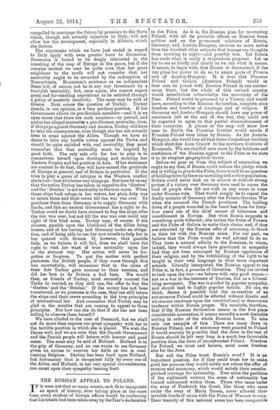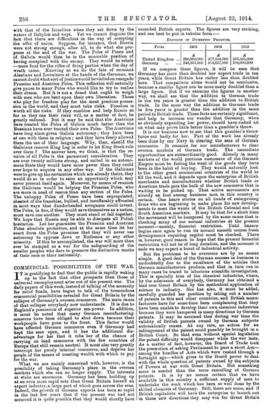THE RUSSIAN APPEAL TO POLAND.
TF it were not that so many events, each fit to inaugurate an epoch of history, were taking place at the same time, every student of foreign affairs would be confessing that his breath had been taken away by the Tsar's declaration to the Poles. As it is, the Russian plan for re-creating Poland, with all its probable effects on Russian home politics and on the permanent relations of Russia, Germany, and Austria-Hungary, receives no more notice than the hundred other subjects that besiege our thoughts from morning to night—and possibly less. Yet Russia has made what is really a stupendous proposal. Let us try to see as briefly and clearly as we can what it means. It means, to begin with, that Russia is determined, if the war gives her power to do so, to annex parts of Prussia and of Austria-Hungary. It is truo that Prussian Poland and Galicia (Austrian Poland) would in that case be joined with Russian Poland in one autono- mous State, but the whole of this revived country would nevertheless acknowledge the suzerainty of the Tsar. Poland would be governed by a Viceroy, and would have, according to the Russian declaration, complete civic freedom and freedom of language and of religion. If Germany and Austria-Hungary should have any power of resistance left at the end of the war, they could not be expected to agree to this partial dismemberment of their countries. A glance at the map will show how near to Berlin the Prussian frontier would recede if Prussian Poland were taken by Russia. As for Austria- Hungary, she would lose all that trans-Carpathian territory which stretches from Cracow to the northern frontiers of Roumania. We are startled once more by the boldness and confidence of the Russian appeal to the Poles as we state it in its simplest geographical terms.
Before we pass on from this subject of annexation we ought to say that, if Russia could redeem the pledge which she is willing to give to the Poles, there would be no question of holding down by force an unwilling and restive population. Britain could never look on in silence or without strong protest if a victory over Germany were used to annex the land of people who did not wish in any sense to come under Russian rule. That would simply be to repeat the deadly mistake of Germany after the Franco-German War when she annexed the French provinces. The holding down of a people wounded in the heart has been for forty- four years one of the chief causes of bitterness and unsettlement in Europe. But what Russia suggests is something quite different ; she invites the Poles of Prussia and the Poles of Galicia to make their choice, and, if they are attracted by the Russian offer of autonomy, to throw in their lot with the Russian arms. For our part, we believe that the Poles would be well advised to do so. They have a natural affinity to the Russians, to whom, indeed, they would always have gravitated in sympathy had they not been estranged by Russian oppression of their religion, and by the withholding of the right to be taught in their own language in their more important schools. Literally interpreted, the Russian appeal to the Poles is, in fact, a promise of liberation. They are invited to look upon the war—we believe with very good reason— not as a war in the interests of Tsarism, but as a Liberal- izing movement. The war is guided by popular sympathy, and should lead to highly popular results. No one. we think, deems it possible that the re-creation of an autonomous Poland could be effected without drastic and wholesome reactions upon the constitutional or democratic tendency within Russia proper. We conclude, therefore, that if the Russian declaration means in the first place considerable annexation, it means secondly a most desirable setting in order of the whole Russian house. To take only one example of this. There are many Jews in Russian Poland, and if autonomy were granted to. Poland it would scarcely be possible that the Jews in the rest of Russia should be left very long in a, much less favourable position than the Jews of reconstructed Poland. Freedom for Poland, we trust and believe, must mean freedom also for the Jews.
But will the Poles trust Russia's word ? It is an important question, for if they could trust her to make good her promise they would surely not refuse the offer of reunion and autonomy, which would satisfy their unextin- guished cravings for nationality. Ever since the partition of the eighteenth century the sense of nationality has burned undimmed within them. Those who came under the sway of Frederick the Great, like those who came under the sway of Maria Teresa, never allowed their invisible bonds of union with the Poles of Warsaw to snap. Their tenacity of this national sense has been comparable with that of the Israelites when they sat down by the waters of Babylon and wept. Yet we cannot disguise the fact that there are difficulties in the way of accepting the offer of union. Suppose, for instance, that Russia were not strong enough, after all, to do what she pro- poses at the end of the war. The Poles of Posen and of Galicia would then be in the miserable position of having conspired with the enemy. They would be rebels —mere food for the rifles of firing parties when the day of wrath came. Knowing as we do the fate of recusant Alsatians and Lorrainers at the hands of the Germans, we cannot doubt what sort of justice would be visited on renegade Prussian and Austrian Poles. This reflection will naturally give pause to many Poles who would like to try to realize their dream. But it is not a dread that ought to weigh with men who are bent upon their own liberation. Those who play for freedom play for the most precious posses- sion in the world, and they must take risks. Freedom is worth all the risks. If they combine and help Russia so far as they can their risks will, as a matter of fact, be greatly reduced. But it may be said that the Austrians have treated the Poles of Galicia much better than the Russians have ever treated their own Poles. The Austrians have long since given Galicia autonomy ; they have been at one with them in religion ; and they have freely allowed them the use of their language. Why, then, should the Galicians remove King Log in order to let King Stork rule over them ? The answer here, we think, is that the re- union of all Poles is the paramount consideration. They are over twenty millions strong, and united in an autono- mous State they would have more power than they could ever hope to acquire in any other way. If the Galicians were to give up the certainties which are already theirs, they would do so in order to seize an opportunity which may never present itself again. Moreover, by means of reunion the Galicians would be helping the Prussian Poles, who are more in need of rescue than any section of the Poles. The unhappy Poles of Posen have been expropriated, cheated of the franchise, bullied, and insufferably affronted in most ways that dunderheaded arrogance could invent. The Poles, in fine, if they would save themselves as a nation, must save one another. They must stand or fall together. We hope that Russia may be able to dissipate all Polish hesitation. Let her guarantee the Prussian and Austrian Poles absolute protection, and at the same time let her exact from the Poles promises that they will never use autonomy to oppress Jews or Ruthenea or any other minority. If this be accomplished, the war will more than ever be stamped as a war for the safeguarding of the smaller peoples who dare to preserve the distinctive marks of their race or their nationality.



































 Previous page
Previous page